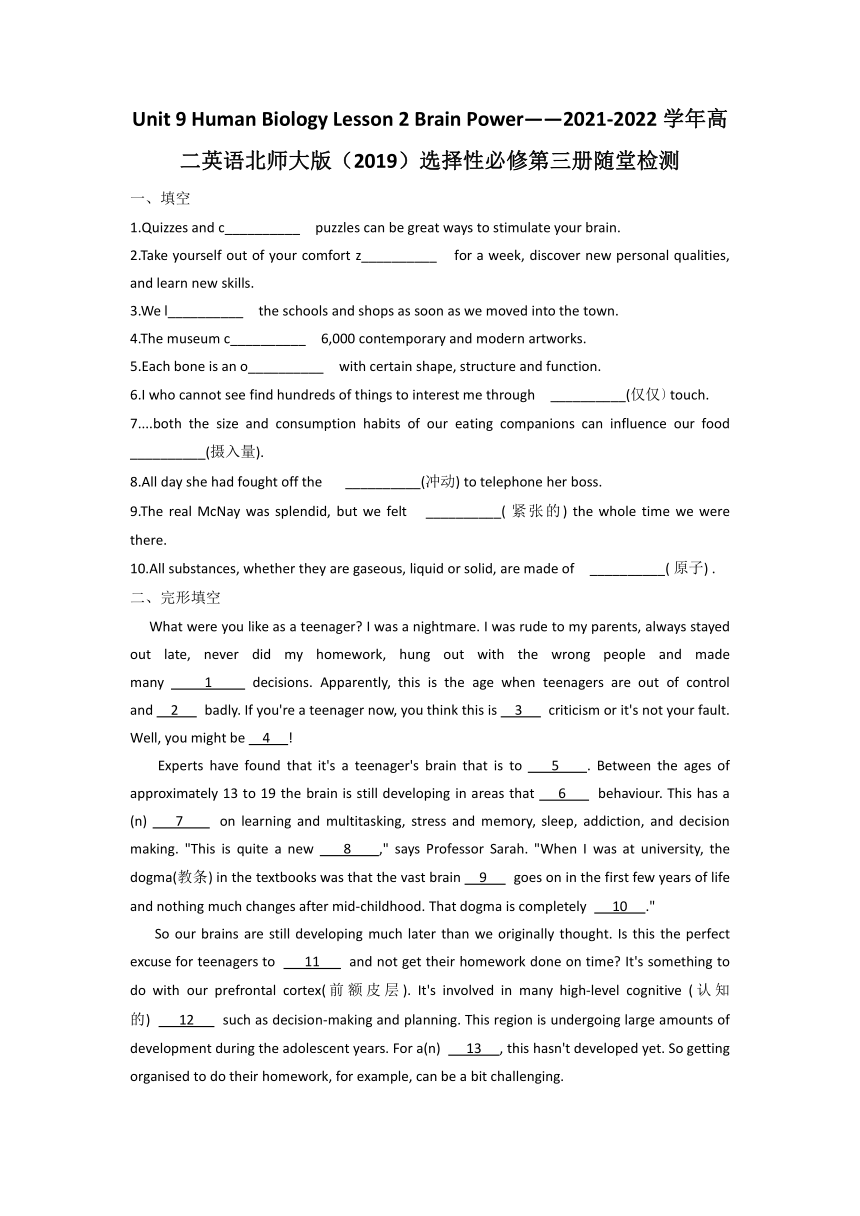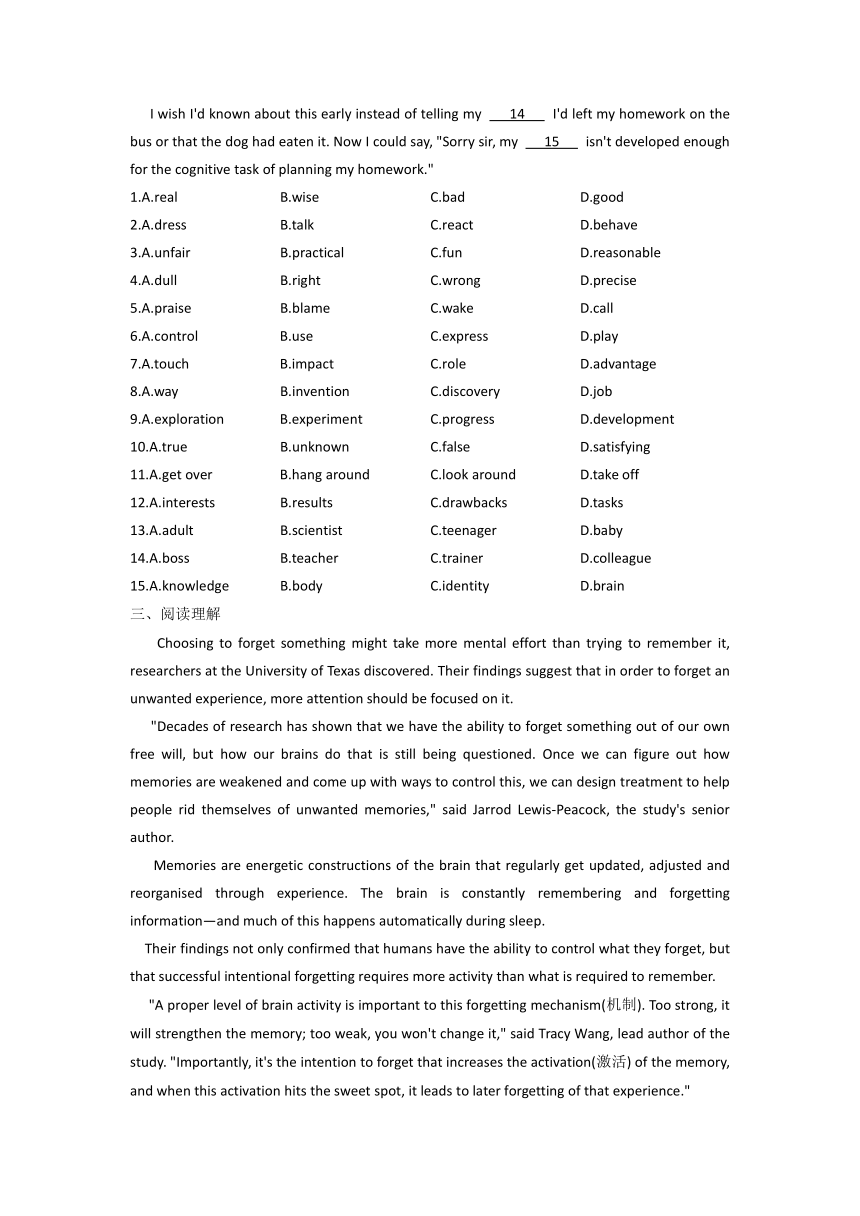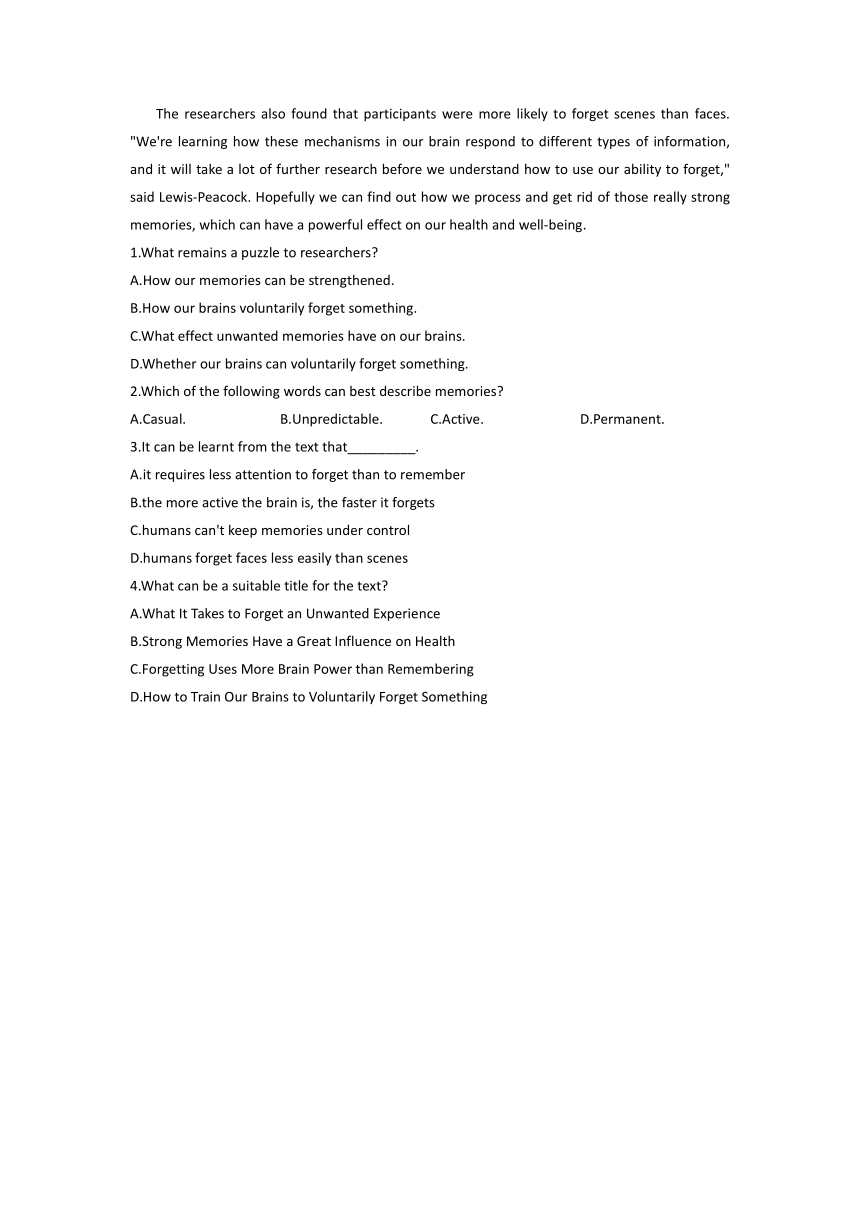北师大版(2019)选择性必修 第三册Unit 9 Human Biology Lesson 2 Brain Power随堂检测(含答案)
文档属性
| 名称 | 北师大版(2019)选择性必修 第三册Unit 9 Human Biology Lesson 2 Brain Power随堂检测(含答案) |

|
|
| 格式 | docx | ||
| 文件大小 | 20.1KB | ||
| 资源类型 | 教案 | ||
| 版本资源 | 北师大版(2019) | ||
| 科目 | 英语 | ||
| 更新时间 | 2022-03-05 00:00:00 | ||
图片预览



文档简介
Unit 9 Human Biology Lesson 2 Brain Power——2021-2022学年高二英语北师大版(2019)选择性必修第三册随堂检测
一、填空
1.Quizzes and c__________ puzzles can be great ways to stimulate your brain.
2.Take yourself out of your comfort z__________ for a week, discover new personal qualities, and learn new skills.
3.We l__________ the schools and shops as soon as we moved into the town.
4.The museum c__________ 6,000 contemporary and modern artworks.
5.Each bone is an o__________ with certain shape, structure and function.
6.I who cannot see find hundreds of things to interest me through __________(仅仅) touch.
7....both the size and consumption habits of our eating companions can influence our food __________(摄入量).
8.All day she had fought off the __________(冲动) to telephone her boss.
9.The real McNay was splendid, but we felt __________(紧张的) the whole time we were there.
10.All substances, whether they are gaseous, liquid or solid, are made of __________(原子).
二、完形填空
What were you like as a teenager I was a nightmare. I was rude to my parents, always stayed out late, never did my homework, hung out with the wrong people and made many 1 decisions. Apparently, this is the age when teenagers are out of control and 2 badly. If you're a teenager now, you think this is 3 criticism or it's not your fault. Well, you might be 4 !
Experts have found that it's a teenager's brain that is to 5 . Between the ages of approximately 13 to 19 the brain is still developing in areas that 6 behaviour. This has a (n) 7 on learning and multitasking, stress and memory, sleep, addiction, and decision making. "This is quite a new 8 ," says Professor Sarah. "When I was at university, the dogma(教条) in the textbooks was that the vast brain 9 goes on in the first few years of life and nothing much changes after mid-childhood. That dogma is completely 10 ."
So our brains are still developing much later than we originally thought. Is this the perfect excuse for teenagers to 11 and not get their homework done on time It's something to do with our prefrontal cortex(前额皮层). It's involved in many high-level cognitive (认知的) 12 such as decision-making and planning. This region is undergoing large amounts of development during the adolescent years. For a(n) 13 , this hasn't developed yet. So getting organised to do their homework, for example, can be a bit challenging.
I wish I'd known about this early instead of telling my 14 I'd left my homework on the bus or that the dog had eaten it. Now I could say, "Sorry sir, my 15 isn't developed enough for the cognitive task of planning my homework."
1.A.real B.wise C.bad D.good
2.A.dress B.talk C.react D.behave
3.A.unfair B.practical C.fun D.reasonable
4.A.dull B.right C.wrong D.precise
5.A.praise B.blame C.wake D.call
6.A.control B.use C.express D.play
7.A.touch B.impact C.role D.advantage
8.A.way B.invention C.discovery D.job
9.A.exploration B.experiment C.progress D.development
10.A.true B.unknown C.false D.satisfying
11.A.get over B.hang around C.look around D.take off
12.A.interests B.results C.drawbacks D.tasks
13.A.adult B.scientist C.teenager D.baby
14.A.boss B.teacher C.trainer D.colleague
15.A.knowledge B.body C.identity D.brain
三、阅读理解
Choosing to forget something might take more mental effort than trying to remember it, researchers at the University of Texas discovered. Their findings suggest that in order to forget an unwanted experience, more attention should be focused on it.
"Decades of research has shown that we have the ability to forget something out of our own free will, but how our brains do that is still being questioned. Once we can figure out how memories are weakened and come up with ways to control this, we can design treatment to help people rid themselves of unwanted memories," said Jarrod Lewis-Peacock, the study's senior author.
Memories are energetic constructions of the brain that regularly get updated, adjusted and reorganised through experience. The brain is constantly remembering and forgetting information—and much of this happens automatically during sleep.
Their findings not only confirmed that humans have the ability to control what they forget, but that successful intentional forgetting requires more activity than what is required to remember.
"A proper level of brain activity is important to this forgetting mechanism(机制). Too strong, it will strengthen the memory; too weak, you won't change it," said Tracy Wang, lead author of the study. "Importantly, it's the intention to forget that increases the activation(激活) of the memory, and when this activation hits the sweet spot, it leads to later forgetting of that experience."
The researchers also found that participants were more likely to forget scenes than faces. "We're learning how these mechanisms in our brain respond to different types of information, and it will take a lot of further research before we understand how to use our ability to forget," said Lewis-Peacock. Hopefully we can find out how we process and get rid of those really strong memories, which can have a powerful effect on our health and well-being.
1.What remains a puzzle to researchers
A.How our memories can be strengthened.
B.How our brains voluntarily forget something.
C.What effect unwanted memories have on our brains.
D.Whether our brains can voluntarily forget something.
2.Which of the following words can best describe memories
A.Casual. B.Unpredictable. C.Active. D.Permanent.
3.It can be learnt from the text that_________.
A.it requires less attention to forget than to remember
B.the more active the brain is, the faster it forgets
C.humans can't keep memories under control
D.humans forget faces less easily than scenes
4.What can be a suitable title for the text
A.What It Takes to Forget an Unwanted Experience
B.Strong Memories Have a Great Influence on Health
C.Forgetting Uses More Brain Power than Remembering
D.How to Train Our Brains to Voluntarily Forget Something
答案以及解析
一、填空
1.答案:crossword
2.答案:zone
3.答案:located
4.答案:contains
5.答案:organ
6.答案:mere
7.答案:intake
8.答案:impulse
9.答案:nervous
10.答案:atoms
二、完形填空
答案:1-5.CDABB; 6-10.ABCDC; 11-15.BDCBD
解析:1.作者对父母很粗鲁,经常在外面待到很晚,从不做家庭作业,和坏人在外面瞎混,做出很多糟糕的决定。根据前文的hung out with the wrong people可知,此处用“糟糕的(bad)”符合语境。bad和wrong是同义词复现,故选C项。real真实的;wise明智的;good好的。
2.很明显,这是青少年不受控制并且行为举止(behave)糟糕的年龄。结合上文内容可知,前面讲述的都是行为,且下文的that _________ behaviour也是暗示,behave和behaviour是同根词复现,故选D项。dress给(某人)穿衣服;talk 谈话;react起反应。
3.如果你现在是一个青少年,你会认为这是不公平的(unfair)评价,或者这不是你的错。根据下文的it's not your fault可知,此处用“不公平的(unfair)”符合语境,故选A项。practical 实际的;fun有趣的;reasonable合理的。
4.根据第二、三段的内容可知,青少年的行为举止和大脑发育有关系,故此处用“正确的(right)” 符合语境。dull无聊的;wrong错误的;precise准确的。
5.专家们已经发现青少年的大脑要对这种情况负责。praise表扬;blame责怪,指责;wake醒来;call 打电话。结合句意可知,此处考查短语 be to blame“负有责任”,故选B项。
6.结合句意可知,此处是指控制(control)行为的大脑区域,故选A项。use使用;express表达;play玩耍。
7.这些区域会对青少年的学习、多任务处理、压力、记忆、睡眠、爱好和做决定等很多方面有影响(impact)。touch 触摸;role角色;advantage优势。 故选B项。
8.根据上文的“Experts have found that it's a teenager's brain that is to ________.”可知,Sarah教授说,这是一个非常新的发现(discovery)。way方法;invention发明;job工作。故选C项。
9.Sarah教授说自己读大学时,书本上说大脑的巨大发展(development)发生在生命的头几年,在童年中期过后就没有多大改变了。前文 Between the ages of approximately 13 to 19 the brain is still developing in areas中的 developing和D项 development是同根词复现,故选D项。exploration探索; experiment实验; progress进步。
10.根据下文的“ So our brains are still developing much later than we originally thought.”可知, Sarah教授说以前的教条是完全错误的( false), 故选C项。true真的; unknown未知的 satisfying令人满意的。
11.根据第一段第三句中的“ never did my homework, hung out with the wrong people”及本空后的 and not get their homework done on time 可知,此处用“闲逛( hang around)”符合语境。故选B项。get over克服;look around环视;take off脱下。
12.根据下文的for the cognitive task of planning my homework可知,此处指涉及很多高水平的认知任务(task),例如决策和计划。task是原词复现,故选D项。interest兴趣;result 结果;drawback缺点。
13.根据上文的“This region is undergoing large amounts of development during the adolescent years.”可知,此处指对于一个青少年(teenager)来说,大脑还没有充分发育。teenager和adolescent 是同义词复现,故选C项。adult成年人;scientist科学家;baby婴儿。
14.作者在感叹要是早点儿知道这些关于大脑研究的发现就好了,就不用跟老师(teacher)编造没做完作业的借口了。boss老板;trainer教练;colleague同事。故选B项。
15.大脑(brain)还没有发育到能够完成规划家庭作业的认知任务。全文讲的是大脑的发育在青少年时期还在进行,并没有完成发育,故选D项。knowledge知识;body身体;identity身份。
三、阅读理解
答案:1-4.BCDC
解析:1.细节理解题。由第二段中的“Decades of research has shown that we have the ability to forget something out of our own free will,.but how our brains do that is still being questioned.”可知,几十年的研究表明我们有能力自动忘记某事,但是大脑是如何做到这一点的仍然是一个谜。故选B项。
2.推理判断题。由第三段第一句“Memories are energetic constructions of the brain that regularly get updated, adjusted and reorganised through experience.”可知,记忆通过经验定期得到更新、调整和重组,故可推知记忆是活跃的。energetic和C项“Active.”相呼应。
3.细节理解题。由最后一段中的“The researchers also found that participants were more likely to forget scenes than faces.”可知,研究人员还发现,被研究的对象更容易忘记场景而非人脸。故选D项。
4.主旨大意题。第一段提到,得克萨斯大学的研究人员发现,选择忘记某事可能比试图记住它需要更多的努力。在最后一段中,Lewis-Peacock提到,研究人员正在学习大脑中的这些机制是如何对不同类型的信息作出反应的,在了解如何遗忘之前,还需要做大量的进一步研究。他希望能找出如何处理和摆脱那些真正强烈的记忆,这些记忆会对健康产生强大的影响。因此可知,本文主要是为了说明忘记某事比记住某事更费脑。故选C项。
一、填空
1.Quizzes and c__________ puzzles can be great ways to stimulate your brain.
2.Take yourself out of your comfort z__________ for a week, discover new personal qualities, and learn new skills.
3.We l__________ the schools and shops as soon as we moved into the town.
4.The museum c__________ 6,000 contemporary and modern artworks.
5.Each bone is an o__________ with certain shape, structure and function.
6.I who cannot see find hundreds of things to interest me through __________(仅仅) touch.
7....both the size and consumption habits of our eating companions can influence our food __________(摄入量).
8.All day she had fought off the __________(冲动) to telephone her boss.
9.The real McNay was splendid, but we felt __________(紧张的) the whole time we were there.
10.All substances, whether they are gaseous, liquid or solid, are made of __________(原子).
二、完形填空
What were you like as a teenager I was a nightmare. I was rude to my parents, always stayed out late, never did my homework, hung out with the wrong people and made many 1 decisions. Apparently, this is the age when teenagers are out of control and 2 badly. If you're a teenager now, you think this is 3 criticism or it's not your fault. Well, you might be 4 !
Experts have found that it's a teenager's brain that is to 5 . Between the ages of approximately 13 to 19 the brain is still developing in areas that 6 behaviour. This has a (n) 7 on learning and multitasking, stress and memory, sleep, addiction, and decision making. "This is quite a new 8 ," says Professor Sarah. "When I was at university, the dogma(教条) in the textbooks was that the vast brain 9 goes on in the first few years of life and nothing much changes after mid-childhood. That dogma is completely 10 ."
So our brains are still developing much later than we originally thought. Is this the perfect excuse for teenagers to 11 and not get their homework done on time It's something to do with our prefrontal cortex(前额皮层). It's involved in many high-level cognitive (认知的) 12 such as decision-making and planning. This region is undergoing large amounts of development during the adolescent years. For a(n) 13 , this hasn't developed yet. So getting organised to do their homework, for example, can be a bit challenging.
I wish I'd known about this early instead of telling my 14 I'd left my homework on the bus or that the dog had eaten it. Now I could say, "Sorry sir, my 15 isn't developed enough for the cognitive task of planning my homework."
1.A.real B.wise C.bad D.good
2.A.dress B.talk C.react D.behave
3.A.unfair B.practical C.fun D.reasonable
4.A.dull B.right C.wrong D.precise
5.A.praise B.blame C.wake D.call
6.A.control B.use C.express D.play
7.A.touch B.impact C.role D.advantage
8.A.way B.invention C.discovery D.job
9.A.exploration B.experiment C.progress D.development
10.A.true B.unknown C.false D.satisfying
11.A.get over B.hang around C.look around D.take off
12.A.interests B.results C.drawbacks D.tasks
13.A.adult B.scientist C.teenager D.baby
14.A.boss B.teacher C.trainer D.colleague
15.A.knowledge B.body C.identity D.brain
三、阅读理解
Choosing to forget something might take more mental effort than trying to remember it, researchers at the University of Texas discovered. Their findings suggest that in order to forget an unwanted experience, more attention should be focused on it.
"Decades of research has shown that we have the ability to forget something out of our own free will, but how our brains do that is still being questioned. Once we can figure out how memories are weakened and come up with ways to control this, we can design treatment to help people rid themselves of unwanted memories," said Jarrod Lewis-Peacock, the study's senior author.
Memories are energetic constructions of the brain that regularly get updated, adjusted and reorganised through experience. The brain is constantly remembering and forgetting information—and much of this happens automatically during sleep.
Their findings not only confirmed that humans have the ability to control what they forget, but that successful intentional forgetting requires more activity than what is required to remember.
"A proper level of brain activity is important to this forgetting mechanism(机制). Too strong, it will strengthen the memory; too weak, you won't change it," said Tracy Wang, lead author of the study. "Importantly, it's the intention to forget that increases the activation(激活) of the memory, and when this activation hits the sweet spot, it leads to later forgetting of that experience."
The researchers also found that participants were more likely to forget scenes than faces. "We're learning how these mechanisms in our brain respond to different types of information, and it will take a lot of further research before we understand how to use our ability to forget," said Lewis-Peacock. Hopefully we can find out how we process and get rid of those really strong memories, which can have a powerful effect on our health and well-being.
1.What remains a puzzle to researchers
A.How our memories can be strengthened.
B.How our brains voluntarily forget something.
C.What effect unwanted memories have on our brains.
D.Whether our brains can voluntarily forget something.
2.Which of the following words can best describe memories
A.Casual. B.Unpredictable. C.Active. D.Permanent.
3.It can be learnt from the text that_________.
A.it requires less attention to forget than to remember
B.the more active the brain is, the faster it forgets
C.humans can't keep memories under control
D.humans forget faces less easily than scenes
4.What can be a suitable title for the text
A.What It Takes to Forget an Unwanted Experience
B.Strong Memories Have a Great Influence on Health
C.Forgetting Uses More Brain Power than Remembering
D.How to Train Our Brains to Voluntarily Forget Something
答案以及解析
一、填空
1.答案:crossword
2.答案:zone
3.答案:located
4.答案:contains
5.答案:organ
6.答案:mere
7.答案:intake
8.答案:impulse
9.答案:nervous
10.答案:atoms
二、完形填空
答案:1-5.CDABB; 6-10.ABCDC; 11-15.BDCBD
解析:1.作者对父母很粗鲁,经常在外面待到很晚,从不做家庭作业,和坏人在外面瞎混,做出很多糟糕的决定。根据前文的hung out with the wrong people可知,此处用“糟糕的(bad)”符合语境。bad和wrong是同义词复现,故选C项。real真实的;wise明智的;good好的。
2.很明显,这是青少年不受控制并且行为举止(behave)糟糕的年龄。结合上文内容可知,前面讲述的都是行为,且下文的that _________ behaviour也是暗示,behave和behaviour是同根词复现,故选D项。dress给(某人)穿衣服;talk 谈话;react起反应。
3.如果你现在是一个青少年,你会认为这是不公平的(unfair)评价,或者这不是你的错。根据下文的it's not your fault可知,此处用“不公平的(unfair)”符合语境,故选A项。practical 实际的;fun有趣的;reasonable合理的。
4.根据第二、三段的内容可知,青少年的行为举止和大脑发育有关系,故此处用“正确的(right)” 符合语境。dull无聊的;wrong错误的;precise准确的。
5.专家们已经发现青少年的大脑要对这种情况负责。praise表扬;blame责怪,指责;wake醒来;call 打电话。结合句意可知,此处考查短语 be to blame“负有责任”,故选B项。
6.结合句意可知,此处是指控制(control)行为的大脑区域,故选A项。use使用;express表达;play玩耍。
7.这些区域会对青少年的学习、多任务处理、压力、记忆、睡眠、爱好和做决定等很多方面有影响(impact)。touch 触摸;role角色;advantage优势。 故选B项。
8.根据上文的“Experts have found that it's a teenager's brain that is to ________.”可知,Sarah教授说,这是一个非常新的发现(discovery)。way方法;invention发明;job工作。故选C项。
9.Sarah教授说自己读大学时,书本上说大脑的巨大发展(development)发生在生命的头几年,在童年中期过后就没有多大改变了。前文 Between the ages of approximately 13 to 19 the brain is still developing in areas中的 developing和D项 development是同根词复现,故选D项。exploration探索; experiment实验; progress进步。
10.根据下文的“ So our brains are still developing much later than we originally thought.”可知, Sarah教授说以前的教条是完全错误的( false), 故选C项。true真的; unknown未知的 satisfying令人满意的。
11.根据第一段第三句中的“ never did my homework, hung out with the wrong people”及本空后的 and not get their homework done on time 可知,此处用“闲逛( hang around)”符合语境。故选B项。get over克服;look around环视;take off脱下。
12.根据下文的for the cognitive task of planning my homework可知,此处指涉及很多高水平的认知任务(task),例如决策和计划。task是原词复现,故选D项。interest兴趣;result 结果;drawback缺点。
13.根据上文的“This region is undergoing large amounts of development during the adolescent years.”可知,此处指对于一个青少年(teenager)来说,大脑还没有充分发育。teenager和adolescent 是同义词复现,故选C项。adult成年人;scientist科学家;baby婴儿。
14.作者在感叹要是早点儿知道这些关于大脑研究的发现就好了,就不用跟老师(teacher)编造没做完作业的借口了。boss老板;trainer教练;colleague同事。故选B项。
15.大脑(brain)还没有发育到能够完成规划家庭作业的认知任务。全文讲的是大脑的发育在青少年时期还在进行,并没有完成发育,故选D项。knowledge知识;body身体;identity身份。
三、阅读理解
答案:1-4.BCDC
解析:1.细节理解题。由第二段中的“Decades of research has shown that we have the ability to forget something out of our own free will,.but how our brains do that is still being questioned.”可知,几十年的研究表明我们有能力自动忘记某事,但是大脑是如何做到这一点的仍然是一个谜。故选B项。
2.推理判断题。由第三段第一句“Memories are energetic constructions of the brain that regularly get updated, adjusted and reorganised through experience.”可知,记忆通过经验定期得到更新、调整和重组,故可推知记忆是活跃的。energetic和C项“Active.”相呼应。
3.细节理解题。由最后一段中的“The researchers also found that participants were more likely to forget scenes than faces.”可知,研究人员还发现,被研究的对象更容易忘记场景而非人脸。故选D项。
4.主旨大意题。第一段提到,得克萨斯大学的研究人员发现,选择忘记某事可能比试图记住它需要更多的努力。在最后一段中,Lewis-Peacock提到,研究人员正在学习大脑中的这些机制是如何对不同类型的信息作出反应的,在了解如何遗忘之前,还需要做大量的进一步研究。他希望能找出如何处理和摆脱那些真正强烈的记忆,这些记忆会对健康产生强大的影响。因此可知,本文主要是为了说明忘记某事比记住某事更费脑。故选C项。
